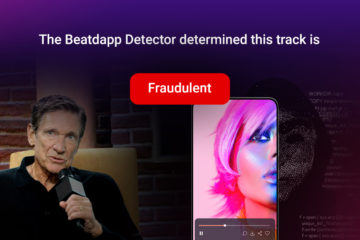Merriam-Webster’s dictionary defines steaming fr… Just kidding. How lame of an opener would that be?!
We talk a lot about streaming fraud around here: in articles, podcasts, blog posts, you name it. To us, it feels like common knowledge. But actually finding a uniform definition isn’t as easy as you’d think. And if we’re going to solve it, we should probably agree on what it means.
To some, it’s “anything which isn’t fans listening to music they love.” To others, it’s akin to how “an athlete might take performance-enhancing drugs only to keep up with their peers.” To others still it’s, “when an artist uses artificial means to increase their streams.”
None of those, however, feel totally adequate.
That’s because there are two different motivations, both of which need to be satisfied by a definition.
And when we talk about streaming fraud, we usually only cover one: the artist-centric view of the problem. In doing this we:
- Make artists seem responsible for WAY more fraud than they are;
- Trivialize legitimate criminal enterprise by making streaming fraud sound innocent.
We risk mischaracterizing the seriousness of the problem when we talk about it like: “aw-shucks, I accidentally bought some fake streams…” In reality, it’s often more nefarious, deliberate, and far removed from real artists. It’s the intentional uploading of algorithmically generated, nonsense, or copyright infringing material for the sole purpose of diverting streaming revenues to the perpetrator at the expense of every other legitimate rights holder.
So we propose to define it as follows:
Streaming fraud is when an individual or group leverages bots, stolen accounts, or manipulated platform features to alter the perception of their own commercial success and/or steal streaming income that otherwise belongs to every legitimate artist and music industry professional.
Perception fraud – check. Financial fraud – check. A little less blame ascribed to artists – check.
No definition is perfect, but we hope this helps set the table for more robust conversation about streaming fraud, and how to fight it.


